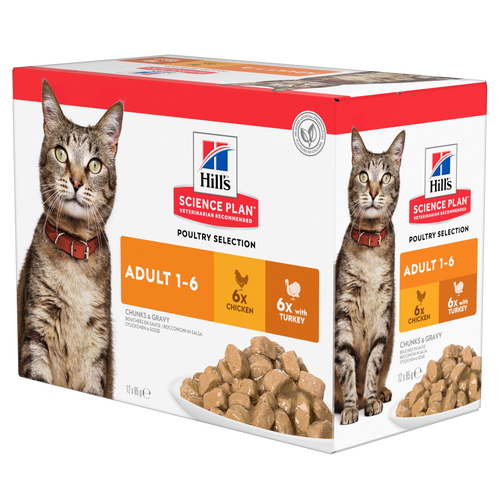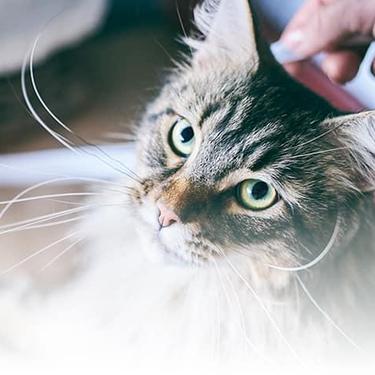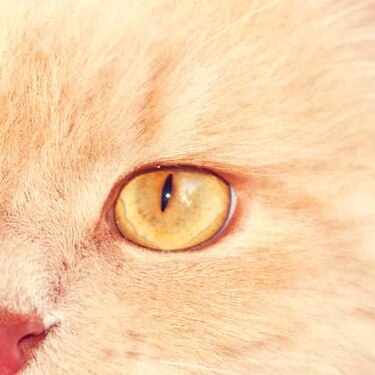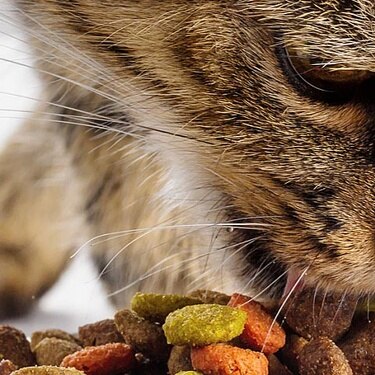
-
Find the right food for your petTake this quiz to see which food may be the best for your furry friend.Find the right food for your petTake this quiz to see which food may be the best for your furry friend.Featured products
 Puppy Food
Puppy FoodHill's Science Plan Puppy Multipack Wet Dog Food with Chicken & Beef are complete premium pet foods for growing puppies from weaning until 1 year old and for pregnant and nursing dogs. Your puppy will love these deliciously smooth and savoury minced loaves, formulated for balanced nutrition and overall health.
Shop Now Mature Adult Dog Food
Mature Adult Dog FoodHill's Science Plan Mature Adult Multipack Wet Dog Food with Chicken & Beef are complete premium pet foods for mature adult dogs from 7 years. Your dog will love these deliciously smooth and savoury minced loaves, formulated to deliver the appropriate amount of energy to support the needs of adult dogs.
Shop Now Adult Wet Dog Food with Beef
Adult Wet Dog Food with BeefHill's Science Plan Adult Multipack Wet Dog Food with Chicken, Beef & Turkey are complete premium pet foods for adult dogs from 1 year. Your dog will love these deliciously smooth and savoury minced loaves, formulated for balanced nutrition and overall health.
Shop NowFeatured products Light Adult Multipack Wet Cat Food with Chicken & Ocean Fish
Light Adult Multipack Wet Cat Food with Chicken & Ocean FishTender chicken chunks in gravy for cats, with L-carnitine and fewer calories for ideal weight management. Packed with high-quality protein, omega-6s, and vitamin E for shiny fur and healthy skin.
Shop Now Mature Adult Wet Cat Food with Chicken
Mature Adult Wet Cat Food with Chicken
Tender chicken chunks in gravy for mature adult cats. Made with easy-to-digest ingredients, high-quality protein for lean muscle maintenance and antioxidant vitamins C+E for optimal health.
Shop Now Adult Multipack Wet Cat Food with Beef, Ocean Fish & Chicken
Adult Multipack Wet Cat Food with Beef, Ocean Fish & ChickenTender chunks in gravy for cats, with high-quality protein to maintain lean muscle. With vitamin E and omega-3s & -6s for healthy skin and balanced minerals to support healthy vital organs.
Shop Now -
Dog
- Dog Tips & Articles
-
Health Category
- Weight
- Food & Environmental Sensitivities
- Urinary
- Digestive
- Joint
- Kidney
-
Life Stage
- Puppy Nutrition
- Adult Nutrition
- Senior Nutrition
Cat- Cat Tips & Articles
-
Health Category
- Weight
- Skin & Food Sensitivities
- Urinary
- Digestive
- Kidney
-
Life Stage
- Kitten Nutrition
- Adult Nutrition
Featured articles The Right Diet For Your Pet
The Right Diet For Your PetIn people, the right diet is very important. If you are eating the wrong way for your metabolism, activity level, age and lifestyle you could end up with health issues.
Read More The Incredible Science Behind Your Pet's Microbiome
The Incredible Science Behind Your Pet's MicrobiomeLearn what your pet's microbiome is, how it contributes to your pet's gut and overall health, and why nutrition is important in maintaining healthy microbiomes.
Read More Show some love with wet foods: a great choice for pets with health issues
Show some love with wet foods: a great choice for pets with health issuesShow some love with wet foods: a great choice for pets with health issues.
Read More -


The cat is usually fastidious about its toilet habits and will consistently use a litter tray indoors, if it is provided, or soil in the garden. If she is soiling indoors it can therefore be very worrying.
Occasionally a one-off accident can occur if a cat is ill, trapped in a room or suddenly frightened. If inappropriate defecation in the home persists it should be investigated for the health and welfare of the cat.

Whatever the cause, punishment is not the answer. This will only make the cat fearful and the problem worse. Deterrents, such as tin foil, pepper, citrus peel or a water pistol will merely redirect the behaviour to another site, cause further anxiety and delay investigating the root cause for the behaviour. Despite the unpleasant nature of this problem it is important to remember - this is not a dirty protest! The cat is not seeking revenge or making a point; something has gone wrong in its world and a certain amount of detective work is required to find out what.
Cleaning soiled areas
Whether a genuine accident or not, once the cat has defecated at a particular location its sensitive nose will encourage it to use that place as a regular toilet.
The best way to break the habit is to keep the cat away from the area as long as possible, remove any smell that the cat can detect and change the geography of the location by using pieces of furniture to block access. Wash the area with a 10% solution of biological or enzymatic washing powder and then rinse with cold water and allow to dry.
Why does my cat soil indoors?
There are numerous reasons why an individual cat would start to soil indoors. Listed below are the most common reasons together with possible solutions.
Illness Urinary tract disease or diarrhoea: can cause soiling as the cat is either in discomfort or just couldn't make it to the litter tray or outside. Possible solution: Treatment by a veterinary surgeon will usually return the cat's habits to a normal acceptable pattern. Occasionally cats will continue to soil if they have experienced discomfort on the tray so it may be necessary to provide an additional tray elsewhere to encourage use.
Old age: An older cat may not want to venture out in bad weather or may be have problems using the cat flap because of stiff joints. As a cat gets older it becomes more insecure and it may feel threatened by the presence of other cats in the territory. Possible solution: It is almost inevitable that, at some stage, elderly cats will require safe and accessible toilet facilities indoors. The provision of an indoor litter tray often resolves this problem. It is always important to rule out medical causes for soiling in the elderly.


Tasty Tips
Fear or anxiety: Cats are at their most vulnerable when defecating outside and, if they feel threatened, it may deter them from doing so. Other cats are usually the biggest problem but it could be a neighbour's dog or even a sudden loud noise. Possible solution: The provision of a discreet litter tray indoors will take away the feelings of anxiety and the need for the cat to make a conscious decision to find a suitable toilet site. Accompanying the cat on visits to the garden may also help. Your cat may normally have chosen to toilet well away from its home so it may be beneficial to make its own garden more appealing. Create an area of soil in a quiet corner relatively close to the house (for ease of escape back indoors) and mix in a high proportion of peat-free soil or sand.
Presence of strangers: Occasionally a cat will urinate or defecate indoors if strangers are in the home and access to the litter tray or outdoors would require the cat to pass through the same room as the visitor. Some cats suffer from 'home alone' anxieties when their owners go away and leave them to defend the house by themselves. The presence of a stranger caring for them can cause some cats to feel intensely threatened and subsequently 'mark' an area, particularly the owner's bed, which has a strong, familiar and reassuring scent. Possible solution: provide an indoor litter facility in the room where the cat seeks refuge just in case he gets 'caught short'! The best way to avoid 'home alone' soiling is to keep the bedroom door shut and try to get familiar people to care for your cat in your absence. Some cats are particularly prone to the stress of being left behind and they actually benefit from a visit to a reputable and caring FAB Listed Boarding Cattery. Specialist help Soiling can be cured in many cats using the techniques outlined here. In some cases the problem can be more persistent and it is advisable to discuss it with your veterinary surgeon rather than leave it to resolve on its own.


One of our staff authors prepared this article for you
Related products

Tender chicken chunks in gravy for cats, with L-carnitine and fewer calories for ideal weight management. Packed with high-quality protein, omega-6s, and vitamin E for shiny fur and healthy skin.

Tender chicken chunks in gravy for mature adult cats. Made with easy-to-digest ingredients, high-quality protein for lean muscle maintenance and antioxidant vitamins C+E for optimal health.


Tender chunks in gravy for cats, with high-quality protein to maintain lean muscle. With vitamin E and omega-3s & -6s for healthy skin and balanced minerals to support healthy vital organs.
Related articles

There are three common ways to feed a cat. Each way has its advantages and disadvantages.

Learn how to make homemade cat treats that are healthy for your pet with this recipe from Hills Pet Nutrition.

Chocolate is known to be poisonous for dogs, but it can also be toxic for cats. Learn why chocolate is bad for cats & what to do if she's eaten it.

From essential vitamins & minerals to different types of meat, learn what to look for when choosing the best cat food for your feline.

Put your cat on a diet without them knowing
Our low calorie formula helps you control your cat's weight. It's packed with high-quality protein for building lean muscles, and made with purposeful ingredients for a flavourful, nutritious meal. Clinically proven antioxidants, Vitamin C+E, help promote a healthy immune system.
Put your cat on a diet without them knowing
Our low calorie formula helps you control your cat's weight. It's packed with high-quality protein for building lean muscles, and made with purposeful ingredients for a flavourful, nutritious meal. Clinically proven antioxidants, Vitamin C+E, help promote a healthy immune system.

